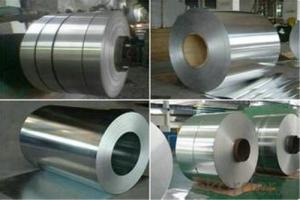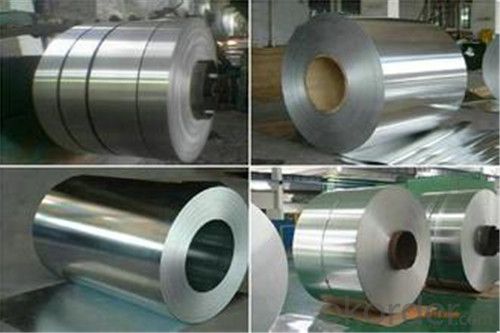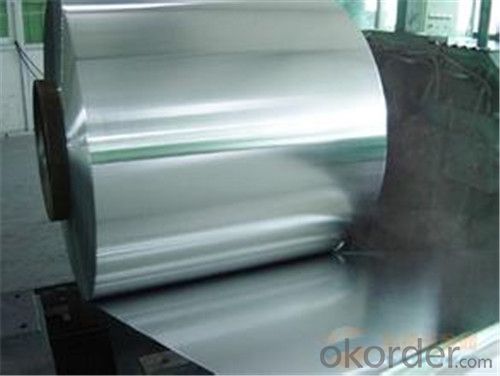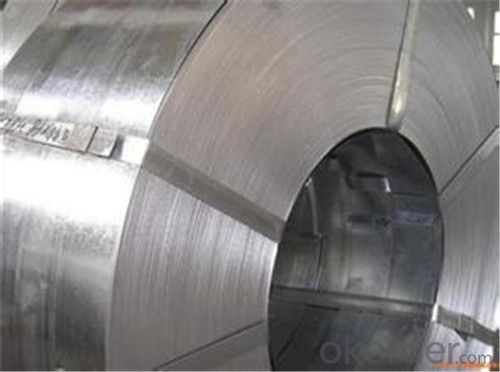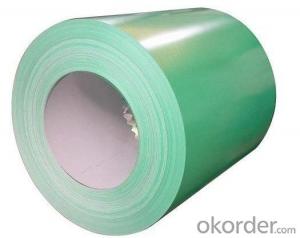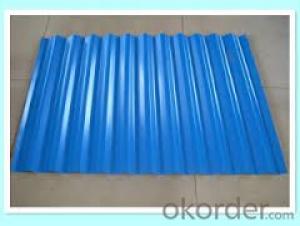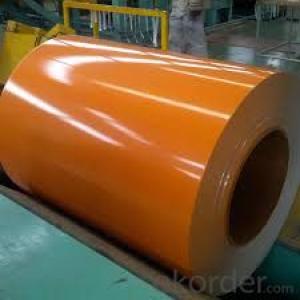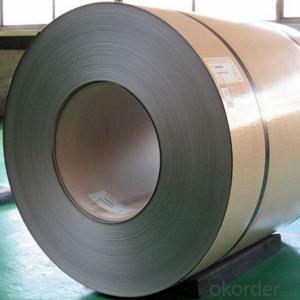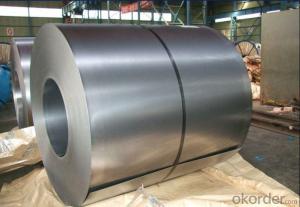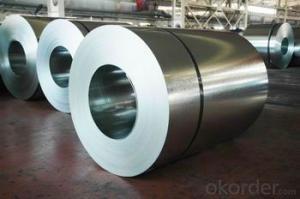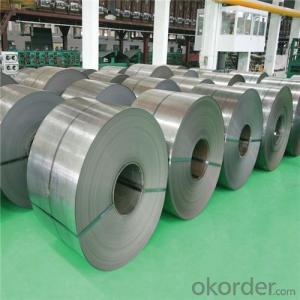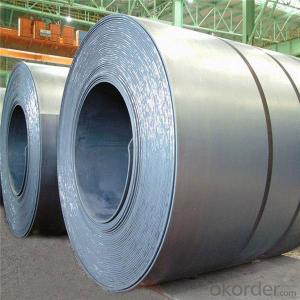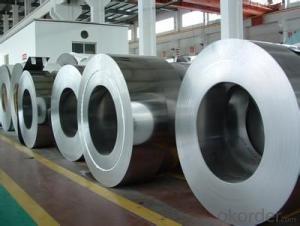Rolled Steel Coil/Plates with High Quality
- Loading Port:
- Tianjin
- Payment Terms:
- TT OR LC
- Min Order Qty:
- 100 m.t.
- Supply Capability:
- 89000000 m.t./month
OKorder Service Pledge
OKorder Financial Service
You Might Also Like
Description of cold rolled steel coil :
The raw material of cold rolled steel coil/sheet is high quality hot rolled product, and after pickling, kinds of new technology and new process of global cold rolling production have been applied. Therefore the manufacturing, home appliance, automobile etc.
Specification of cold rolled steel coil :
1. Width: 600~1500mm
2. Thickness: 0.15~2.30mm
3. Grade: JIS G3321-SGLCC, SGLC400-570, (G550)
EN10346-DX51D+AZ, DX53D+AZ, S250-S550
ASTM A792M CS-B, SS255-SS550
4. Chemical Treatment: Chromated
5. Surface: Anti-Finger Print
6. Oil: Slight Oiled / Dry
7. Spangle: Regular
8. Zinc Coating: AZ50~AZ185g/m2
9. Coil Weight: 3~14MT
10. Coil ID: 508mm / 610mm
11. MOQ: 60MT per size or by negotiation
Characteristic cold rolled steel coil :
1. Refrigerators, cabinets, power distribution baords and drums.
2. Automobile floor and roof panels.
3. Automobile fenders and quarter panels
4. Automobile fenders and quarter panels
Images of cold rolled steel cold rolled steel coil:
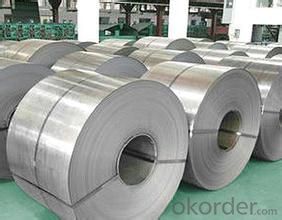
FAQ
1.What's your MOQ?
50MT, it is for one container.
2.Whether your company have QC teams?
Yeah, sure, our QC team is very important, they will keep the quality control for our products.
3. What's your normal delivery time?
Our delivery time about 10-20days for standard sizes, if you have other requirements like hardness and width ,it is about 20-40days. But don't worry ,we also try our best for the
- Q: How do steel coils contribute to the construction sector?
- Steel coils contribute to the construction sector in several ways. Firstly, they are used to manufacture structural components such as beams, columns, and steel frames, which provide strength and support to buildings and infrastructure. Secondly, steel coils are used to produce reinforcement bars that are embedded in concrete, enhancing its tensile strength and durability. Additionally, steel coils are utilized in the construction of bridges, pipelines, and other large-scale projects that require robust and long-lasting materials. Overall, steel coils play a vital role in the construction sector by providing the necessary materials for sturdy and resilient structures.
- Q: does anyone out there know where to get a good deal on a pedal steel guitar? i am from northern indiana and i'm willing to travel some if i have to.i am just getting into pedal steel guitar and i really don't have any idea what i need. i don't know how to play a guitar (i do know how to play the piano and the drums) at all but i want to learn to play the pedal stell guitar and i can't do that without getting one first so, if anyone can help me out i would greatly appreciate it! :o)
- Pedal steel guitars are a challenge to learn but they're a great instrument. More, even a starter pedal steel is going to run you $800 or so. Elderly Instruments in Lansing, Michigan sells a Carter brand starter pedal steel for $795 which is about as low as I've seen new ones. It has 3 foot pedals and 4 knee levers so it's nicely equipped. From northern Indiana it's not that far I would think. Good luck.
- Q: What's the best material for color coated steel coil?
- Color steel roll is a kind of composite material, also called color coating steel plate. It is produced by continuous coating on the production line by surface degreasing and phosphating etc. after being coated with organic coating, the product is made by baking. Color steel roll is a composite material, both steel and organic materials, both of them a little. Both the mechanical strength of steel plate and easy molding performance, but also organic materials, good decoration, corrosion resistance.
- Q: Are steel coils used in electrical equipment manufacturing?
- Yes, steel coils are commonly used in electrical equipment manufacturing. Steel coils are often used as core material in transformers, motors, and generators due to their magnetic properties and ability to efficiently transfer electrical energy. They provide structural support and help enhance the performance and efficiency of electrical equipment.
- Q: Hello people.Me and the life mate have been working on a fantasy book together and we are currently in the process of outlining the cultures. The culture of our antagonists' is a sort of woodland tribal/celtic[ish] deal and they are very nature oriented. Being a detail freak and wanting to have some real world credibility in the story, I am trying to decide how they produce steel. I want steel to be an important part of the culture, but a thing that is in limited supply. I also do not want there to be a large amount of resources committeded to mining or processing iron ore for steel. So does anyone have any real world ideas explaining how the people can produce steel without using underground mining operations, large processing facilities, and without raping the land?All help and ideas are appreciated
- Well, steel is just modified iron, so you're going to have to start with acquiring the iron first. For that, you're most likely going to be using some sort of underground mining somewhere - either they do that themselves, or they purchase the iron elsewhere. Assuming you're not dealing with meteoric iron (which is possible, but pretty uncommon), or iron sands (not likely in a woodland area), then unless you're dealing with a rocky outcropping with iron veins out in the open, I'm pretty sure there needs to be somebody doing some digging. That said, it doesn't need to be a full raping of the land scenario. A couple of minor mines, some small-scale smelting operations, and somebody knowing the secret of making steel, and it could give you small amounts of steel without making an ecological disaster.
- Q: How are steel coils used in the production of steel containers?
- Steel containers rely heavily on steel coils as a vital component in their production. These coils, made from flat-rolled steel, serve as the foundation for the container's main body. To start the process, the steel coils are unwound and fed into a rolling mill. Here, they undergo a sequence of procedures to shape and mold the steel. One of these steps involves heating the coils to a specific temperature, making them more malleable and easier to manipulate. Subsequently, the hot coils pass through a series of rollers that gradually reduce their thickness and elongate them to the desired size. This entire procedure is referred to as hot rolling. Once the steel coils have been rolled to the necessary thickness, they are then cooled and transformed into sheets. These sheets are further treated to eliminate any imperfections or irregularities, guaranteeing a smooth and even surface. This is accomplished through processes like pickling, where acid is used to remove any scale or rust, and cold rolling, where the sheets are passed through rollers at room temperature to achieve the desired thickness and surface finish. After the sheets have been cleaned and refined, they are molded into the shape of the container. This typically involves a technique known as stamping, in which hydraulic presses are used to press the steel sheets into a mold. The mold determines the container's shape and size, and the steel sheets are pressed against it with great force, resulting in the desired container shape. Once the containers have been formed, they undergo several finishing processes, including welding, painting, and coating. These processes are carried out to enhance the containers' durability, appearance, and resistance to corrosion. These final touches ensure that the steel containers meet the necessary standards and are of high quality for their intended use. In conclusion, steel coils are of paramount importance in the manufacturing of steel containers, as they provide the raw material needed for their production. Through a series of steps, the steel coils are shaped, cut, and formed into sheets, which are then further processed and molded into the desired container shape. The outcome is a robust and dependable steel container suitable for various applications across industries.
- Q: Have spent two days making a specialized knife out of 304 stainless steel, after throwing into a log it bent slightly arghhhh. Is it worth continuing to finish it off or start all over again with different kind of steel if so which kind should i use.
- Sorry okorder /... I hope that link works but as you can see you dont want to use 303.304.316,410,416,430 You can get away with 301 but would be best to use 440. It kind of sounds like your a home shop guy. It would be best for you to make a knife out of a1 or d2 tool steel. with these steels you can torch heat them to a red hot heat where a magnet will not stick to them. Then let them cool slowly in the air. After that you can temper in a oven around 400f. This will a very hard long lasting knife. Check OKorder for good steel prices. A1 and D2 are not stainless but they are the best for a home shop. If you go stainless you can buy preharden material but you will have to grind everything. You can also pay someone to harden your knife but dont plan on it being cheap.
- Q: I wasn't expecting much because i knew it was cheap (Trying to avoid high prices) But anyway i cut a few bottles and cans and i noticed the very edge of the blade was starting to bend. I ignored it and tried it on a 3 inch limb, and the whole blade bent sideways where the limb hit it.I heard cold steel was supposed to be top quality and I wanted to know how durable their swords are and if they're worth it. Thanks!
- O.Adequate. First and fundamental it takes coaching and observe to use a katana. There may be a little bit component known as 'system'. You need to to search out an trainer. Except you're a fairly significant man, an O Katana is conveniently too large for you. Weapons of this way were not used for dueling, they have been further anti-cavalry weapons. As a substitute cumbersome for one in the direction of one combat. The cold steel katanas are not very regularly correct varieties of a japanese sword - missing finesse and poorly balanced. They are going to take a beating though and it seems like that's what you probably giving it. Severely, you possibly more often than not a hazard to your self and possible others round you - to search out an teacher.
- Q: Why people prefer prefabricated buildings these days? Recently my friend has told me that he is going to owe a steel house so I was just thinking are these steel structures really durable and cheaper than concrete structures?
- its faster to build with prefabricated steel materials. if its cheaper or not...im not really sure. but definitely faster
- Q: Can steel coils be used in the production of packaging materials?
- Certainly, packaging materials can indeed utilize steel coils. Frequently, steel coils serve as the primary material in packaging items like metal strapping and steel banding. These coils possess remarkable strength, durability, and exceptional tensile strength, rendering them perfectly suitable for effectively securing and safeguarding diverse products throughout their transportation and storage. Furthermore, steel coils can be effortlessly molded and fashioned into various packaging elements, guaranteeing a dependable and secure packaging solution for an extensive array of industries.
Send your message to us
Rolled Steel Coil/Plates with High Quality
- Loading Port:
- Tianjin
- Payment Terms:
- TT OR LC
- Min Order Qty:
- 100 m.t.
- Supply Capability:
- 89000000 m.t./month
OKorder Service Pledge
OKorder Financial Service
Similar products
Hot products
Hot Searches
Related keywords
